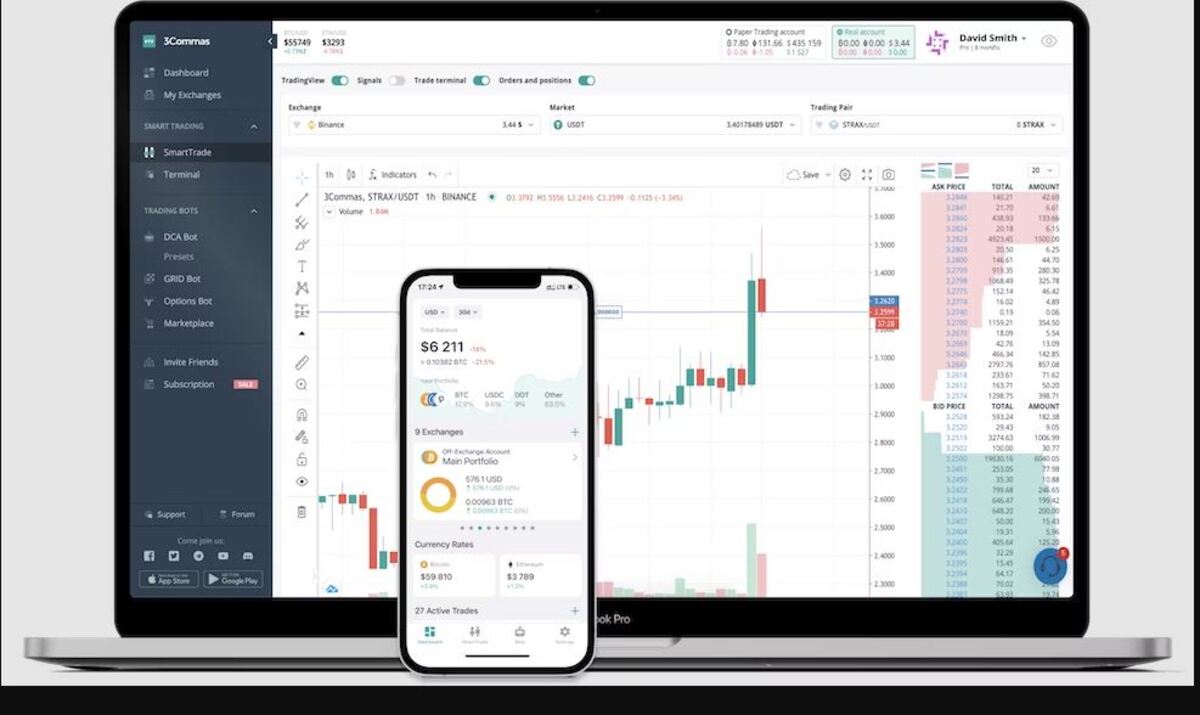Ethereum is the second-largest cryptocurrency by market capacity. Does that make Ethereum viable as a good investment? What drives cryptocurrencies such as Ethereum to be evaluated and traded? Some might even say cryptocurrencies have no value and are in a bubble! In this guide, we show you how to invest in Ethereum.
The cryptocurrency market can be a mind-boggling myriad of tokens that will send newcomers reeling in confusion. Given the low barrier of creating and listing a cryptocurrency, many cryptocurrencies have come and gone. But some projects have withstood the test of time. They are making leaps and bounds in both their technological developments and market valuation. As of September 2019, among the top cryptocurrencies by market capacity, Ethereum takes the runner-up, a position just before Bitcoin. This position has thrust Ethereum into the spotlight not only within the cryptocurrency and blockchain communities but also in traditional media. With the amount of publicity and analysis around Ethereum, it is not surprising to find people asking themselves if they should start looking into Ethereum as a good investment.
This article will explore Ethereum as a project, going into a summary of its history and application. Also, there will be a discussion about past market history. This is to provide some context to the position of Ethereum in the cryptocurrency market. Practical information such as the accessibility and storage of the cryptocurrency will also be touched upon.
Before we proceed, please note that this article will only serve as a discussion on Ethereum and should not be considered as financial advice. No one can predict the market. Besides, the reader should make up his or her mind. This article shall take a neutral stance and focus on facts instead of buying and selling Ethereum.
How To Invest In Ethereum: What Is Ether?
Ethereum is a blockchain-based decentralized public platform that has an open-sourced philosophy. It allows other developers to build applications upon its infrastructure. Launched in 2015, Ethereum is synonymous with Vitalik Buterin, a key person in the development of the Ethereum project. At the time of this article, Ethereum has a circulating supply of approximately 107 million tokens and valued at almost 20 billion. In terms of market capacity, Ethereum is the second largest, second only to the most prominent cryptocurrency of all; Bitcoin.
As a blockchain innovation, Ethereum can currently process approximately 15 transactions per second. This means that it needs three minutes to process one block of a transaction for a total of twelve blocks to reach transaction finality. While not the fastest cryptocurrency in the market, Ethereum is not intended for lightning speed transactions. Ethereum is a decentralized application. However, this transaction speed could change when Ethereum moves from a proof of work to a proof of stake system.
With all its innovations, some speculator might see Ethereum as a good investment. However, one has to understand that it is a utility that drives the project and keep it going. While there is a floating price which allows it to be seen as an investment, Ethereum’s Ether is a utility token and should be treated as such instead of an “Ethereum investment” perspective. Thus, a person looking to buy and sell Ethereum has to understand the purpose for doing so and the logic behind the valuation.


Applications of Ethereum
Ethereum is focusing on smart contracts and proof of work system which centers to the cryptocurrency’s network. These smart contracts are a set of codes and protocols seen as a trustless system for executing predefined terms and conditions. In the traditional sense, numerous intermediaries, acting on behalf of the parties involved, drafted, executed, and enforced most contracts. These intermediaries can range from lawyers to bankers and represent a cost to the existing contractual procedure. With Ethereum’s proposed smart contract, these intermediaries can be cut out of the picture by having consequences from meeting stipulated conditions automatically executed. For example, this could include the transfer of funds after meeting the confirmation of conditions. As such, Ethereum’s technology can help parties save and retain more of their value by reducing both time and contractual costs.
The second distinct feature of Ethereum is its proof of work system. Under this system, there is a crucial and intrinsic value for Ether; Ethereum’s native cryptocurrency token. On the Ethereum platform, the security and functionality of the Ethereum network depend on Ether. Therefore, buying and selling of Ether does not base completely on speculative intentions. There is a strong utility for Ethereum’s native cryptocurrency.


Ether Under The Proof Of Work System
Firstly, there’s a link between the security of the network and the value of Ether. A participant on Ethereum’s network seeking to compromise the network will put that participant’s token value at risk. Secondly, Ether under the proof of work system incentivizes participants to contribute computing power to the Ethereum network. Through the proof of work system, to have Ether, the participants, called miners, contribute computing power and solve complex mathematical puzzles. These Ether tokens are extremely valuable on the Ethereum network and to entities or individuals utilizing the Ethereum network. It is because Ether is not only bought and sold for other tradable cryptocurrency assets. It is also the acceptable medium of value for services rendered on the Ethereum network.
Any transaction taking place on the Ethereum network such as moving of Ether or ERC-20 tokens from wallet to wallet will require computing power measured in “Gas.” Paying of “Gas” is possible by using Ether on the current exchange rate of 1 Ether to 1,000,000,000 Gweis.
There are mentions that in the future, Ethereum will be moved from a proof of work to a proof of stake system. Through this, validators stake tokens will have the right to vote on the affairs on the Ethereum blockchain network.
Market Performance
Earlier in the article, there was a brief discussion on why it is important to understand the purpose of buying and selling Ethereum. The same with the logic behind the valuation. This section of the article will delve briefly into Ethereum’s past market performance and its utility.
Since early 2016, Ethereum has made significant gains raising to heights of over a thousand USD by early 2018. For any individual looking at Ethereum as a good investment, this growth rate is certainly enticing. However, the tendency and potential for sharp price appreciation also mean the same for price depreciation. From early 2018, Ethereum fell from the one thousand range to just below a hundred in early December of the same year. This volatility can be a boon or a bane for an investor looking to buy and sell Ethereum because the potential for losses reflects the same potential for returns. Therefore, only the individual can determine if the Ethereum meets his or her criteria as a good investment.
Now that we have touched on Ethereum’s market performance, let’s consider the factors that could have driven up the valuation.
How To Invest In Ethereum: Valuation Of Ethereum And Cryptocurrencies
Both utility and speculative value determine the valuation of Ethereum and cryptocurrencies.
Ethereum is a decentralized application that allows the building of other blockchain applications. It saw a rise in demand for its platform during the ICO craze back in early 2017. The use of Ether is not only to power other blockchain application being built but also as a means to raise funds. People looking to participate in ICOs could use Ethereum’s Ether. This increase in utility is one of the contributing factors to Ethereum’s past market performance.
Speculation is a rift in any markets. Thus, the rise of Ethereum’s popularity made the speculators enter the market. The tradability of Ethereum in combination with its accessibility on exchanges made it easy for speculators to buy and sell Ethereum. It creates greater volatility in a market marked by an already thin order book when compared to traditional markets.
The cause and result of the supply and demand of the market are impossible to pin down. However, there’s no reason to ignore the utility and speculative factors when it comes to valuing Ethereum.
In the future, if Ethereum moves from a proof of work to a proof of stake system, there could be an effect on the utility value of Ether. The reason for this is during staking, the validators use the network’s native token.


How To Invest In Ethereum: Place To Buy And Sell
As one of the largest cryptocurrencies, Ethereum has gained a lot of integration with exchanges and merchants. This made the buying and selling Ethereum more convenient than other cryptocurrencies. This accessibility to buy and sell Ethereum is important for individuals who are looking to invest in Ethereum, as it represents the ability to be a quick source for liquidity. However, with the newness of the cryptocurrency market, there are asymmetries with platforms and individuals buying and selling Ethereum should take note of key considerations. The criteria that this article will be focusing on are fiat to crypto and crypto to crypto exchanges.
Fiat To Crypto
Fiat to cryptocurrency exchanges allow people interested in buying and selling Ethereum to make their transaction through accepted fiat currency. It tends to have higher fees and a higher minimum trading amount which should be a point to take note for individuals looking to start making an Ethereum investment or participate in Ethereum’s network. This higher cost is a trade-off for convenience as the process to buy and sell Ethereum is more linear and takes place on familiar currency pairs like USD. Some of the popular fiat to cryptocurrency exchanges are CoinBase and CoinHako.
In choosing a fiat to the cryptocurrency exchange, make sure that the exchange is compliant with the regulations and laws surrounding fiat to cryptocurrency trades. As the cryptocurrency market is still operating in an area of greyness, it always pays to check. Investing in Ethereum in some regions and countries might be legal while other places ban cryptocurrency trading altogether.
However, fiat to cryptocurrency exchanges is not the only gateway to buy and sell Ethereum and other cryptocurrencies. There are also the options of crypto to crypto exchanges.
Crypto To Crypto
Cryptocurrency to cryptocurrency exchanges allows individuals to buy and sell Ethereum using other cryptocurrencies such as Bitcoin. These exchanges tend to have a lower trading fee but at the expense of convenience. Someone looking to invest in Ethereum, through the gateway of a cryptocurrency to a cryptocurrency exchange, will either have to acquire other cryptocurrencies through over the counter trading or fiat to a cryptocurrency exchange. If the individual already has some cryptocurrency on hand and wish to start buying and selling Ethereum through cryptocurrency markets, then the disadvantage of convenience is less profound. Popular cryptocurrency to cryptocurrency exchange is Binance and Bittrex.
Other Considerations
Within each category of exchange, there are numerous company’s or platforms providing similar services. Regardless of which is the starting point for the initial buying and selling of Ethereum and other cryptocurrencies, attention must be given to security and the withdrawal conditions. As a general best practice, select only reputable exchanges to avoid being a target for phishing sites. Besides, certain exchanges take more time to complete the transfer of funds. Therefore, it is always wise to read the terms and conditions surrounding fund withdrawal matters on the exchange.
Storing Ethereum
Imagine the entire Ethereum investment lost to hackers. What a nightmare that will be?
It is prudent to always keep your cryptocurrency funds safe; this includes your Ethereum investment. Investing in Ethereum should also be investing in the protection of the Ethereum investments and as such, selecting a suitable wallet is always a good option.
On the market, there are hardware wallets in which your private key does not leave the device signing the transactions. This option is one of the safest methods to safeguard your private keys. However, if the hardware wallet device is lost or damaged, the recovery keys or phase is the only backup. Thus, the responsibility of security falls heavily on the user.
Other options include Web wallets, mobile wallets, and paper wallets, each with their advantages and disadvantages. For more information on these wallets, there is an article on Robots.net that will be incredibly useful, so click here to find out more.

























